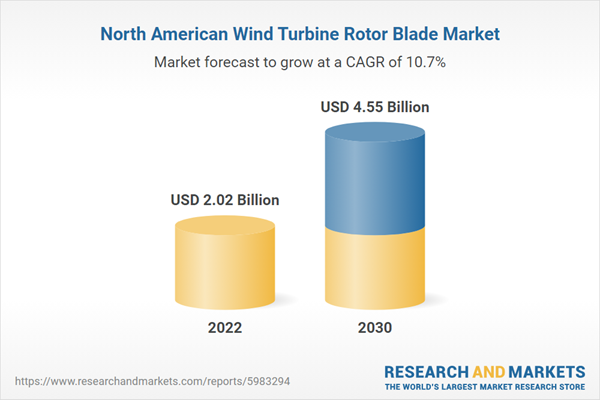Increased Energy Consumption and Trends of Clean Energy North America Wind Turbine Rotor Blade Market.
The demand for energy has rapidly increased since 2000 owing to factors such as industrialization, urbanization, increasing population, and technological developments. As per the IEA’s report, investment in renewable energy has been significantly boosted by the rebound from the COVID-19 pandemic-related downturn and the response to the global energy crisis. When comparing projections for 2023 with the data from 2021, annual investment in clean energy has increased far more quickly than that of fossil fuels throughout this time (24% vs. 15%). Global energy demand is increasing every day, resulting in an energy crisis and contamination of the environment due to carbon emissions. Energy derived from fossil fuels is unsustainable due to limited, depleting supply and the environmental impact. As a result, the trends of sustainable and clean energy production increased in the last few years. Many developed countries, such as the US, Germany, and China, took initiatives to solve the energy crisis issues, resulting in the development of the wind turbine industry.
As per the data published by the U.S. Energy Information Administration in 2022, primary energy consumption in the US was approximately 98 quadrillion British thermal units (Btu) in 2021, which accounted for ~16% of the global primary energy consumption. The electricity consumption in the US peaked in 2022, amounting to 4.05 trillion kWh. The residential sector accounted for 38.9% of total electricity consumption in 2022, whereas commercial and industrial accounted for 35.1% and 25.8% of total consumption, respectively.
As per the government data, in 2022, renewable energy sources amounted to 0.9 trillion kWh, which roughly accounted for 21% of the total US electricity generation.
In addition, as per the IREA (International Renewable Energy Agency), wind energy has developed rapidly since 2000, owing to R&D and reduction in developmental costs. Such factors have affected the development and installation of wind power positively. For instance, global onshore wind capacity increased from 178 GW in 2010 to 699 GW in 2020, whereas offshore wind capacity increased from 3.1 GW in 2010 to 34.4 GW in 2020. Moreover, during 2013-2022, wind energy continued to consolidate its dominance, attracting 32% of global renewable energy investments. Investments in offshore wind have picked up, attracting 8% of the total. Thus, with increased demand for electricity owing to growing population, urbanization, industrialization, and increased preferences for clean energy, the demand for onshore and offshore wind energy projects increased, ultimately driving the wind turbine blades market.
North America Wind Turbine Rotor Blade Market Overview
North America constitutes major economies such as the US, Canada, and Mexico. The North American wind industry is expected to register remarkable growth owing to stringent government regulations, favorable policies, increasing investment in wind power projects, and reduced cost of wind energy. In North America, the growing consumer awareness toward sustainability goals and the role of renewable energy and wind energy are expected to increase wind power installations in the region. North America accounted for 12% of total wind power installations in 2022, with the US accounting for more than 85% of new capacity additions in the region.Wind energy in the US grew at a record growth in the last five years, which represents the largest source of new additions to the US electric-generating capacity. Wind power provides 10% of electricity in 16 states and over 30% in Iowa, Kansas, Oklahoma, South Dakota, and North Dakota. The performance of wind energy technologies, coupled with the production tax credit and lower cost of power generation, accelerated the addition of wind energy capacity. Thus, a rise in investment toward building wind power projects in North America is expected to drive the growth of the wind turbine rotor blade market.
North America Wind Turbine Rotor Blade Market Segmentation
The North America wind turbine rotor blade market is segmented based on type, deployment type, and country. Based on type, the North America wind turbine rotor blade market is segmented into Below 40m, 41-60m, 61-70m, and Above 70m . The 61-70m segment held the largest market share in 2022.In terms of deployment type, the North America wind turbine rotor blade market is bifurcated into onshore and offshore. The onshore services held a larger market share in 2022.
Based on country, the North America wind turbine rotor blade market is segmented into the US, Canada, and Mexico. The US dominated the North America wind turbine rotor blade market share in 2022.
TPI Composites Inc, Vestas Wind Systems AS, ENERCON GmbH, LM Wind Power AS, Siemens Gamesa Renewable Energy SA, Acciona SA, Suzlon Energy Ltd, Nordex SE, and Envision Energy USA Ltd are some of the leading companies operating in the North America wind turbine rotor blade market.
Table of Contents
Companies Mentioned
- TPI Composites Inc
- Vestas Wind Systems AS
- ENERCON GmbH
- LM Wind Power AS
- Siemens Gamesa Renewable Energy SA
- Acciona SA
- Suzlon Energy Ltd
- Nordex SE
- Envision Energy USA Ltd
Table Information
| Report Attribute | Details |
|---|---|
| No. of Pages | 73 |
| Published | May 2024 |
| Forecast Period | 2022 - 2030 |
| Estimated Market Value ( USD | $ 2.02 Billion |
| Forecasted Market Value ( USD | $ 4.55 Billion |
| Compound Annual Growth Rate | 10.7% |
| Regions Covered | North America |
| No. of Companies Mentioned | 9 |









